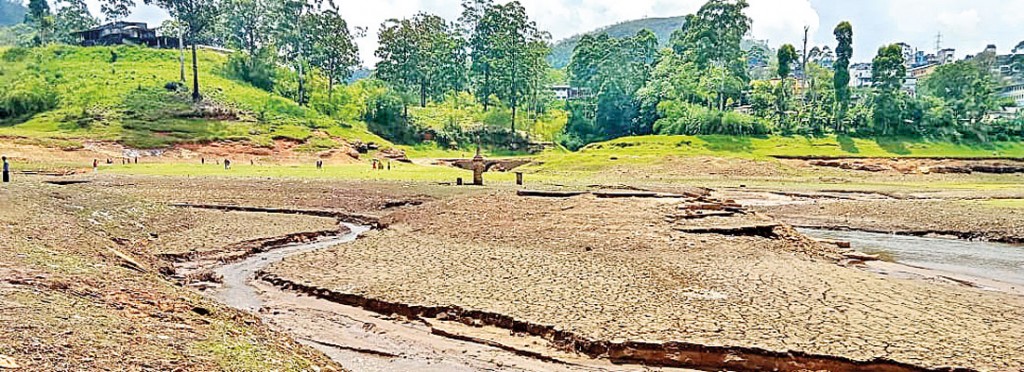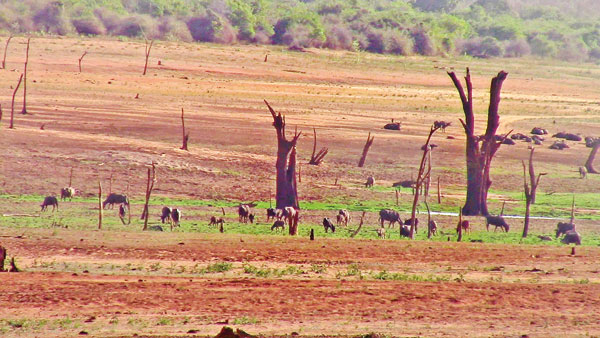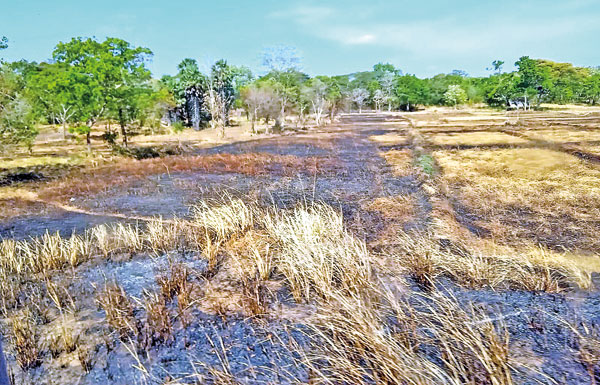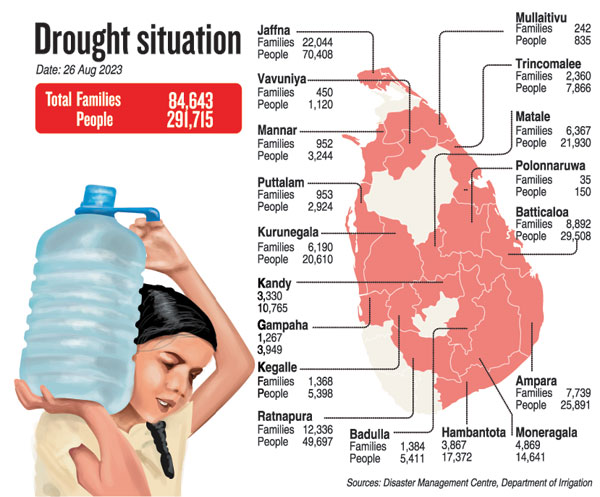News
October rains will determine water availability for Maha cultivation
View(s):By Kasun Warakapitiya
The availability of water for the Maha season paddy cultivation will depend on the rainfall between October and November, Irrigation Director General A. Gunasekara said.
He pointed out that the irrigation tank water levels had further deteriorated, leaving only 22% of the full water capacity of the tanks.
“The water levels of the tanks are also in decline. Even the National Water Supply and Drainage Board (NWSDB), which also takes water from some irrigation tanks, is having difficulty carrying out its water intake from some tanks due to the prevailing drought,’’ he said. He pointed out that the Water Board had requested the Ministry of Water Supply to distribute water via bowsers to the people who depend on tanks to meet their water requirements.

Maussakelle Reservoir Pic by Manula Sellahewa
Mr. Gunasekara explained that they were hoping for rains in October and November and explained that if the rains were further delayed, they would not be able to release water for Maha paddy cultivation.
While water becomes scarce and calls are being made to use it sparingly, the Sunday Times observed people bathing and washing clothes at the already receding irrigation tanks, such as Thissa Wewa, where the NWSDB has the water intake pipe. There were even boards put across the tank wall warning people of the depth, but as the water receded, people made use of the tank.
Mr. Gunasekara said that people should think more about preserving the remainder of the water that is to be used for drinking purposes. He added that the water board should also put someone in place to stop people from reaching the water intake area.
Meanwhile, NWSDB Acting General Manager Ruwan Liyanage told the Sunday Times that they had to move towards strict water management if the drought continued.

Udawalawa - Pic by Rohana Samaraweera
He added that they had taken every measure possible to provide clean drinking water and distribute it according to availability.
“We have a limited amount of water; we have to preserve it as we have to provide drinking water until it rains,’’ he added.
The Meteorology Department warned the drought would continue, and it was expecting heavy rains from October to November according to the prevailing El Nino conditions. (The condition, which affects the world globally, would create increased rainfall in certain areas of the world while causing some areas to face drought.)
Duty Meteorologist Preethika Jayathilake said light showers were expected in the southwestern area at the end of August and the first week of September, yet that rain is not enough to alleviate the drought.
She added that they were expecting heavy rains from October to November.

Anuradhapura - Pic by Kasun Warakapitiya
Meanwhile, farmers lamented that they had not yet received compensation for paddy fields destroyed due to the drought. They added that the time-consuming compensation process delays payments.
They added that the amount of compensation also decreased after the Agricultural and Agrarian Insurance Board outlined the conditions to provide compensation.
T. B. Sarath, secretary of the All Island Farmers’ Federation, said that they estimated that around 150,000 acres of paddylands had been destroyed by the drought.
He said the government had not even provided compensation for damage caused during the previous cultivation seasons.
Agriculture Minister Mahinda Amaraweera however said the need for rice imports was not necessary as there were ample stocks of rice that could sustain the country till the upcoming Maha season.
He said that despite the current drought, which he says has damaged 75,000 acres, the provinces unaffected by dry weather were experiencing high yields. Therefore, there was no requirement for rice imports.
He also said there could be an escalation in rice prices due to the prevailing situation. “As the minister of agriculture, I identify the rise in paddy prices as a positive development, yet it is imperative to prevent any inconvenience to consumers,’’ he said.
He pointed out the need for a framework for regulating paddy and rice prices.

The best way to say that you found the home of your dreams is by finding it on Hitad.lk. We have listings for apartments for sale or rent in Sri Lanka, no matter what locale you're looking for! Whether you live in Colombo, Galle, Kandy, Matara, Jaffna and more - we've got them all!

